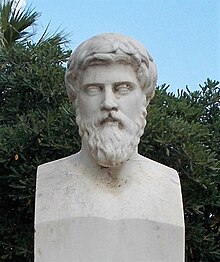– Life
– Plutarch born in Chaeronea
– Family prominent in town
– Chaeronea located 30km east of Delphi
– Greek region of birth
– Education
– Studied philosophy and mathematics in Athens
– Traveled to Egypt to study
– Influenced by Plato’s teachings
– Became a priest of Apollo at Delphi
– Established a school in Chaeronea
– Works
– Wrote Parallel Lives
– Moralia includes ethical essays
– Biographies of famous Greeks and Romans
– Influenced Renaissance writers
– Works translated into many languages
– Influence
– Revered as a great philosopher
– Impact on Western literature
– Renaissance humanists admired his works
– Inspired Enlightenment thinkers
– His writings still studied today
– Legacy
– Plutarch’s works influential in philosophy
– Considered a key figure in ancient literature
– His biographies offer insights into historical figures
– Impact on the development of biography as a genre
– Continues to be a source of inspiration
Plutarch (/ˈpluːtɑːrk/; Greek: Πλούταρχος, Ploútarchos; Koinē Greek: [ˈplúːtarkʰos]; c. AD 46 – after AD 119) was a Greek Middle Platonist philosopher, historian, biographer, essayist, and priest at the Temple of Apollo in Delphi. He is known primarily for his Parallel Lives, a series of biographies of illustrious Greeks and Romans, and Moralia, a collection of essays and speeches. Upon becoming a Roman citizen, he was possibly named Lucius Mestrius Plutarchus (Λούκιος Μέστριος Πλούταρχος).
Plutarch | |
|---|---|
 Modern portrait at Chaeronea, based on a bust from Delphi tentatively identified as Plutarch | |
| Born | c. AD 46 |
| Died | after AD 119 (aged 73–74) |
| Occupation(s) | Biographer, essayist, philosopher, priest, ambassador, magistrate |
| Notable work | Parallel Lives Moralia |
| Era | Hellenistic philosophy |
| Region | Ancient philosophy |
| School | Middle Platonism |
Main interests | Epistemology, ethics, history, metaphysics |
